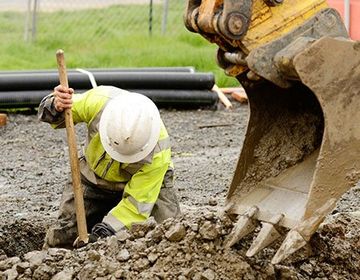Best Dump Truck Companies in Ohio - Top-Rated Dump Truck Providers
Best Dump Truck Companies in Ohio - Top-Rated Dump Truck Providers
Blog Article
Comprehensive Excavation Methods: Mastering the Fundamentals for Success
The careful planning, precise execution, and precise attention to information needed in excavation projects require a comprehensive strategy that encompasses different essential aspects. The real mastery exists not just in recognizing these fundamentals however in flawlessly incorporating them to navigate the intricacies of excavation jobs with finesse.
Understanding Excavation Project Planning

The preliminary stage of any type of excavation project is the preparation stage, where important decisions are made that can dramatically impact the outcome of the task. Comprehending the project range, timeline, and budget plan restrictions is critical for developing a thorough excavation strategy that ensures the task's success.
One secret aspect of excavation project preparation is the advancement of a detailed timeline that lays out the sequence of landmarks, deadlines, and tasks. This timeline works as a roadmap for the task team, permitting them to track development and make needed modifications to make sure the job remains on schedule. Additionally, a well-defined budget that represents all expenses, consisting of tools rental, labor costs, and materials, is important for staying clear of expense overruns and delays. By carefully taking into consideration all these variables during the planning phase, excavation projects can be implemented successfully and effectively, leading to effective outcomes.
Dirt Analysis and Website Examination
Carrying out comprehensive dirt analysis and website examination is a crucial step in the prep work phase of any type of excavation project. Soil evaluation involves determining the structure, structure, and buildings of the dirt at the excavation site. This information is critical for comprehending the dirt's bearing capability, moisture web content, and capacity for erosion, which are essential consider establishing the excavation techniques and devices needed for the job.
Website evaluation exceeds soil analysis and encompasses a more comprehensive assessment of the total site conditions. This examination includes identifying any potential hazards, such as underground utilities, ecological concerns, or unpredictable terrain, that could influence the excavation procedure. By thoroughly evaluating the website, task supervisors can establish reliable excavation methods that focus on safety, efficiency, and environmental protection.
Making use of innovative technologies like ground-penetrating radar, dirt tasting, and drone surveys can improve the accuracy and efficiency of dirt analysis and site examination. Spending time and resources in these preliminary actions can inevitably save time and stop pricey delays or difficulties during the excavation process.
Equipment Selection and Use
Reliable excavation projects count greatly on tactical equipment selection and application to guarantee optimum efficiency and performance. Selecting the ideal tools for the job is essential in optimizing efficiency and minimizing downtime. Elements index such as the sort of soil, depth of excavation, and project range play a significant function in identifying the most suitable devices for the task at hand.
Along with picking the suitable devices, proper application is essential to job success. Operators should be trained to deal with the tools securely and effectively - dump truck companies in ohio. Routine maintenance checks and timely repair work aid protect against breakdowns and ensure consistent efficiency throughout the task
Security Actions and Regulations Compliance
In the realm of excavation tasks, prioritizing precaution and compliance with laws is paramount to guaranteeing a safe and legally audio operational environment. Precaution include a variety of practices, consisting of carrying out detailed site analyses, carrying out appropriate signs and obstacles, and providing adequate safety and security training for all workers associated with the excavation procedure. Adherence to policies, such as OSHA needs in the United States, guarantees that the excavation task satisfies the necessary criteria to safeguard employees, onlookers, and the surrounding atmosphere.

Tracking Development and Adjusting Techniques
Just how can forecast supervisors successfully track the improvement of excavation jobs and adapt their techniques as necessary to maximize outcomes? Surveillance progress is necessary for guaranteeing that excavation jobs remain on track and meet target dates.

Verdict
To conclude, understanding the basics of extensive excavation strategies is important for the success of any kind of job. By understanding task planning, analyzing dirt and site problems, selecting ideal devices, complying with safety and security policies, and monitoring development, job supervisors can guarantee a smooth and reliable excavation procedure. Executing these approaches will bring about successful end results and reduce possible risks or obstacles during the excavation job.
The first phase of any kind of excavation project is the planning phase, where vital choices are made that can considerably influence the outcome of the job. Understanding the job scope, budget plan, and timeline restrictions is crucial for producing a thorough excavation plan that guarantees the task's success.
How can forecast managers properly track the development of excavation jobs and adjust their approaches accordingly to maximize end results? By carefully keeping track of progression and being eager to adjust techniques, project managers can enhance the total success of excavation projects.
By understanding project planning, examining soil and website problems, selecting suitable equipment, complying with safety and security regulations, and checking progress, project supervisors can make certain a smooth and effective excavation procedure.
Report this page